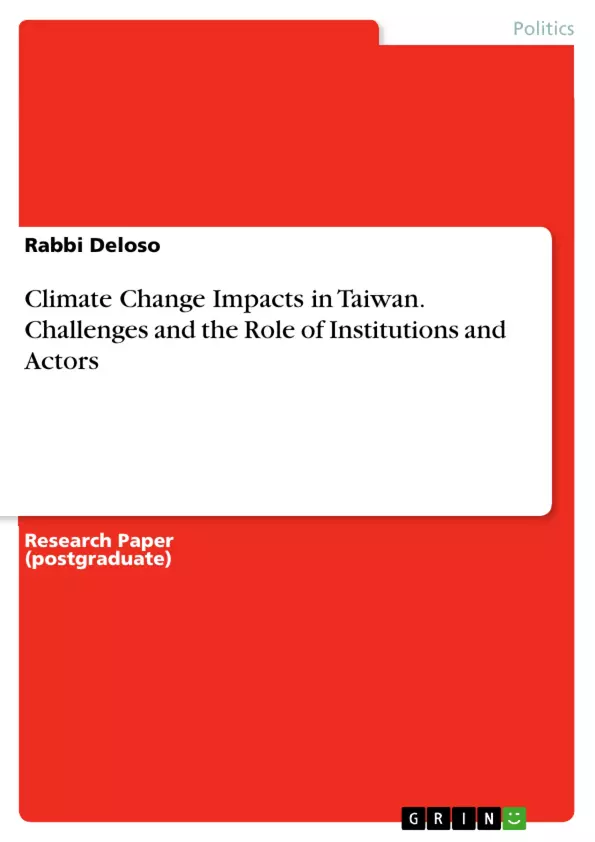With a focus on Taiwan as a local case of exploration, the study seeks to explore the role of institutions and actors who are involved, to identify the challenges experienced in the adopting and implementing process, with the hope to illuminate from the data as to why these challenges exist. The research also touches upon a larger discussion beyond what adaptation strategies can contribute, specifically in framing sustainable development for the country. Taiwan is at the forefront of climate change. The blend of being located at the confluence of three major rivers and being exceptionally low-lying, makes Taiwan vulnerable to natural disasters, such as typhoons and flooding leading to displacement and human catastrophe. On the one hand, this means that the government and citizens of Taiwan has a long history of preparing for, adapting to and recovering from natural disasters.
Using a case study research design, qualitative research methods were employed, and interviews conducted with various actors to achieve the aims of the study. A theoretical and conceptual framework was used on the paradigms of natural hazards and vulnerability, the three components of adaptation, and the role of actors and institutions. In terms of knowledge and involvement with climate-related adaptation, it is an emerging aspect set within the larger disaster risk reduction context. Identified challenges in educating and communicating the strategies often emerge at the government and community-levels, potentially drawing from bureaucratic challenges funnelling down to local government units, which are exacerbated by feelings of distrust and strained relations of communities toward the government. Finally, few themes were found from the data in connecting climate change adaptation strategies to a greater role in framing sustainable development in Taiwan. However, alleviation of impoverished conditions and education were two critical aspects for cultivating knowledge needed to promote long-term efforts toward resilience, and thus sustainability of the local people during disaster events.
Inhaltsverzeichnis (Table of Contents)
- Introduction
- Approach and Methods
- Theoretical and Conceptual Framework
- Geographical and Policy Setting of Study Area
- Results
- Discussion
- Conclusion
Zielsetzung und Themenschwerpunkte (Objectives and Key Themes)
The study investigates the role of institutions and actors in climate change adaptation in Taiwan, with a focus on the challenges encountered in the adoption and implementation process. The research aims to understand the reasons behind these challenges and explore how adaptation strategies can contribute to sustainable development in the country. The study utilizes qualitative research methods and interviews with various stakeholders to achieve its aims.
- Climate change adaptation in Taiwan
- The role of institutions and actors in adaptation
- Challenges in implementing adaptation strategies
- The relationship between adaptation and sustainable development
- The impact of Typhoon Haiyan on Taiwan
Zusammenfassung der Kapitel (Chapter Summaries)
- Introduction: This chapter introduces the study's context, highlighting the complex nature of climate change and the challenges faced by decision-makers. It defines adaptation and explores the history of scientific discovery regarding climate change. The chapter discusses evidence of climate change impacts and emphasizes the need for adaptation efforts.
- Approach and Methods: This chapter outlines the research design, including the theoretical and conceptual framework used for the study. It also describes the geographical and policy setting of the study area, Taiwan.
- Results: This chapter presents the findings of the research, focusing on the role of institutions, the challenges encountered in adaptation, and the connections between adaptation and sustainable development. The chapter explores the experiences and perspectives of stakeholders involved in climate change adaptation in Taiwan.
- Discussion: This chapter analyzes the results of the research, examining the implications of the findings for climate change adaptation and sustainable development in Taiwan. It explores the challenges and opportunities associated with adapting to climate change in the context of a rapidly developing island nation.
Schlüsselwörter (Keywords)
This study focuses on key concepts such as sustainable development, climate change adaptation, disaster risk reduction, institutions, and the role of actors. It examines the case of Taiwan, a country highly vulnerable to climate change impacts, and analyzes the challenges and opportunities associated with adapting to these impacts.
Frequently Asked Questions
Why is Taiwan particularly vulnerable to climate change?
Taiwan's low-lying geography and its location at the confluence of major rivers make it highly susceptible to typhoons, flooding, and natural disasters.
What are the main challenges in implementing adaptation strategies in Taiwan?
Challenges include bureaucratic hurdles, lack of trust between communities and the government, and difficulties in educating the public about long-term climate risks.
What role do institutions play in disaster risk reduction?
Institutions are responsible for creating policies, managing resources, and coordinating recovery efforts, though their effectiveness often depends on local government cooperation.
How does climate adaptation link to sustainable development?
Adaptation strategies, such as improving education and alleviating poverty, help build long-term resilience, which is essential for the sustainability of local communities during climate events.
What was the impact of Typhoon Haiyan on the region?
Typhoon Haiyan served as a critical example of human catastrophe and displacement, highlighting the urgent need for more effective climate change adaptation and disaster preparedness.
- Quote paper
- Rabbi Deloso (Author), 2008, Climate Change Impacts in Taiwan. Challenges and the Role of Institutions and Actors, Munich, GRIN Verlag, https://www.grin.com/document/1268962



